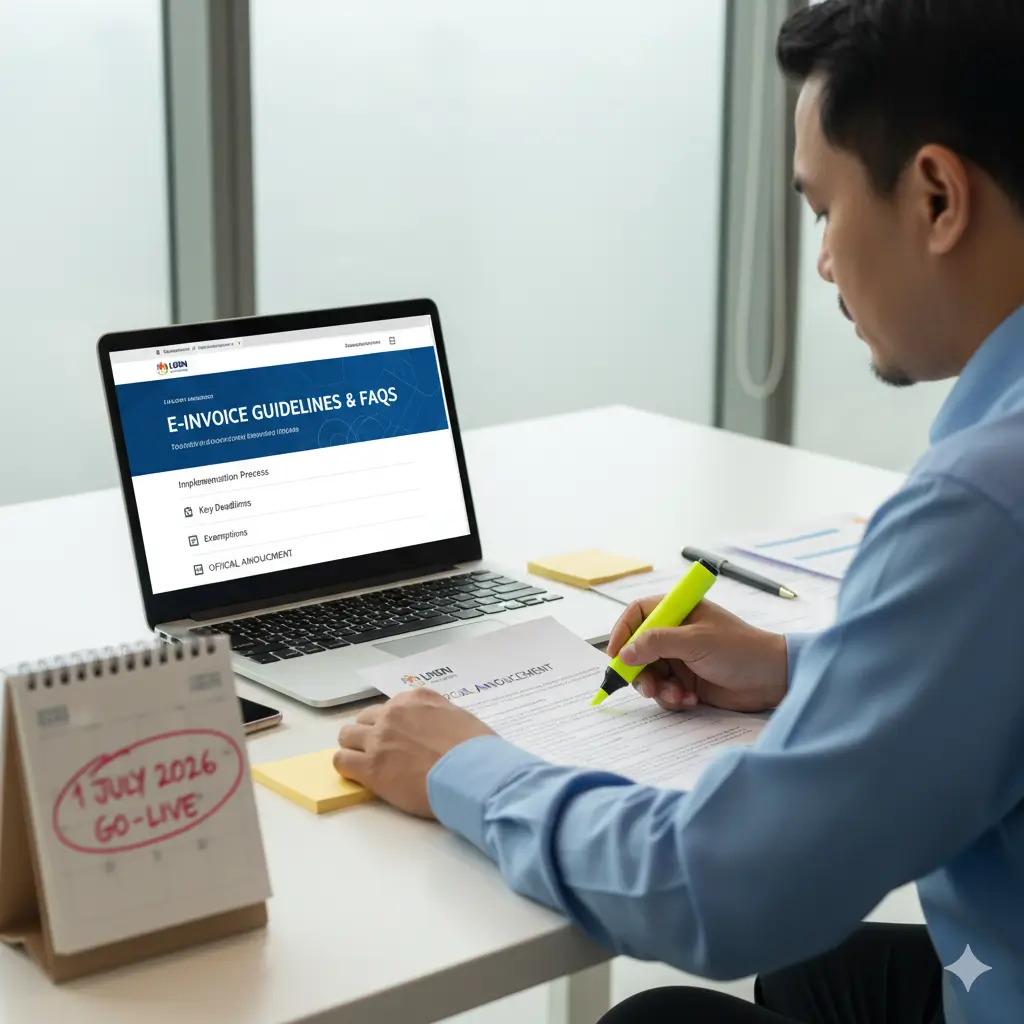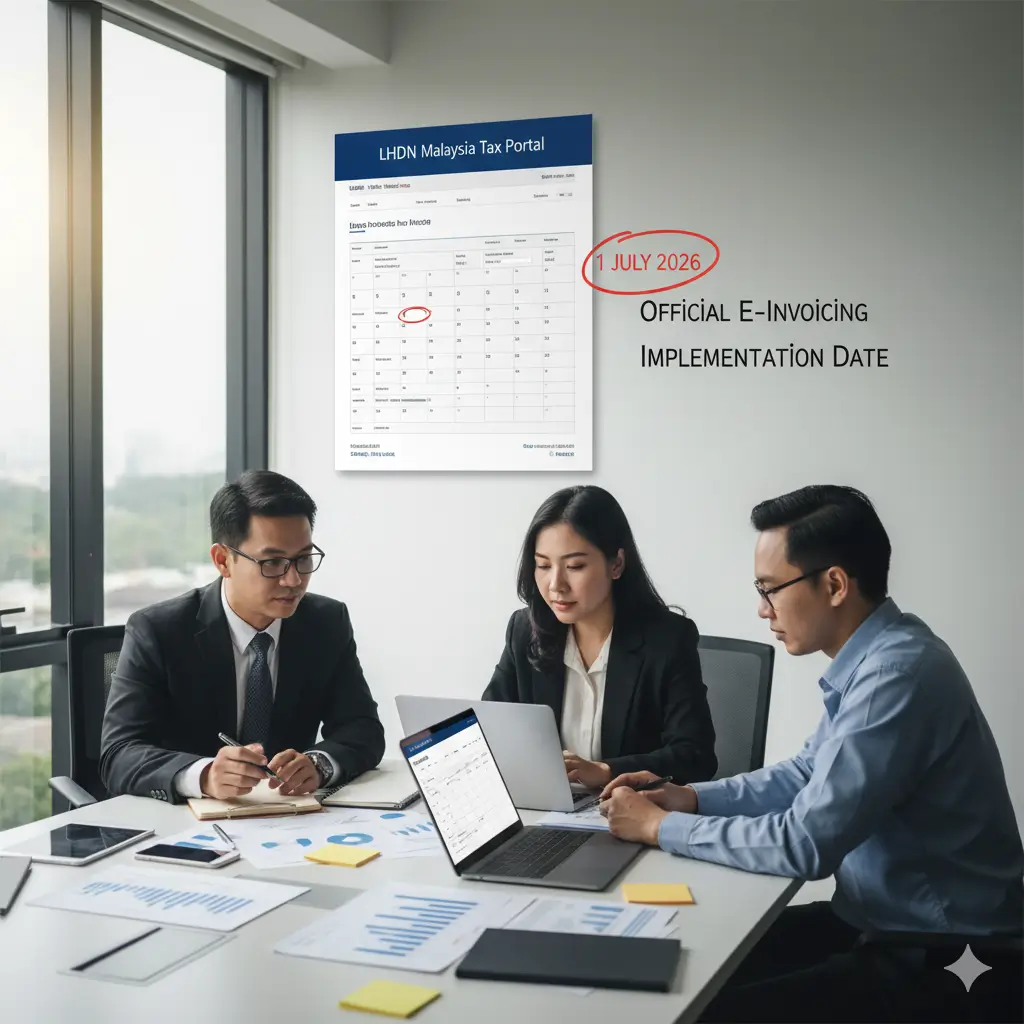The e-invoice implementation date in Malaysia is one of the most critical regulatory changes businesses must prepare for, as confirmed by the Inland Revenue Board of Malaysia (LHDN).
With the final roll-out date set for 1 July 2026, this mandate will affect enterprises across all sectors, from SMEs to large corporations.
Key Takeaways (Q&A)
Q1: What is 1 July 2026 the Official E-Invoice Implementation Date Confirmed by LHDN, and why does it matter?
A: LHDN has confirmed 1 July 2026 as the final e-invoice implementation date for SMEs in Malaysia. This matters because it ensures businesses, from startups to corporations, meet tax compliance, transparency, and digital reporting standards.
Q2: How does the e-invoice implementation date work in practice?
A: The e-invoice implementation date is phased by annual turnover thresholds, beginning in August 2024 for large corporations and ending on 1 July 2026 for SMEs, with a six-month relaxation period granted after each phase.
Q3: What should businesses do next to prepare for the e-invoice implementation date?
A: Companies should review compliance requirements, strengthen accounting and tax reporting systems, and seek advisory from firms like Procheck to manage documentation, optimize tax planning, and ensure smooth digital adoption before deadlines.
E-invoicing is more than just a compliance requirement—it is part of Malaysia’s digital tax transformation strategy aimed at strengthening transparency, reducing fraud, and streamlining reporting.
For businesses, this means shifting from manual or semi-automated invoicing systems to structured electronic formats that integrate with LHDN’s platform.
The implications are significant, impacting cash flow management, tax audits, and long-term business efficiency.
Procheck Faculty Sdn Bhd, a 100% Bumiputera-owned firm with over 25 years of experience in taxation, assurance, corporate services, and advisory, plays a crucial role in helping businesses navigate this transition.
Their expertise ensures that SMEs, multinational corporations, and entrepreneurs alike are not only compliant but also strategically positioned to benefit from digital invoicing.
“Provide service account, tax, audit, company secretary.”
Hans Empire, ★★★★★
“Perkhidmatan Setiausaha Syarikat dari Procheck sangat profesional dan cekap. Mereka membantu saya menguruskan dokumentasi syarikat dengan teliti dan memastikan pematuhan undang-undang. Terima kasih kepada pasukan Procheck yang sangat berdedikasi!”
Noor Ariffshah, ★★★★★
These endorsements highlight Procheck’s commitment to ensuring that businesses, regardless of size or industry, receive practical and dependable guidance in managing regulatory changes like e-invoicing.
As the deadline approaches, understanding the phases, exemptions, penalties, and compliance strategies tied to the e-invoice implementation date is essential.
This article explores these aspects in detail while showing how Procheck can support your business every step of the way.
Simplify Your Tax Management Today!
Partner with Procheck today to unlock your business’s full potential. Our team of experts is ready to help you navigate taxation challenges and achieve your strategic goals.
Request a Free Consultation
Get started with a no-obligation consultation to discover how we can transform your financial operations.
What Is the E-Invoice Implementation Date and Why Does It Matter?
The e-invoice implementation date refers to the official deadlines set by the Inland Revenue Board of Malaysia (LHDN) for businesses to adopt electronic invoicing.
This shift is significant because it impacts SMEs, multinational corporations, startups, and entities engaged in mergers and acquisitions by standardizing digital tax reporting.
- It matters because e-invoicing will:
- Enhance tax transparency
- Reduce fraud and leakages
- Streamline reporting and audits
- Support Malaysia’s digital economy goals
- Enhance tax transparency
Phased Roll-Out: What Are the Implementation Dates by Annual Turnover Threshold?
The e-invoice roll-out is structured by annual revenue, ensuring large corporations transition first while giving smaller businesses time to adapt.
How Large Corporations Are Affected by the Early Start Date
Businesses with revenue above RM100 million began e-invoicing in August 2024. These corporations act as early adopters, ensuring the system works at scale.
When SMEs Need to Begin E-Invoicing Compliance
SMEs with turnover between RM1–5 million must comply by 1 January 2026, while those below RM1 million have until 1 July 2026, the final e invoice start date.
Which Entities Are Covered Under Each Threshold
- RM100 million: 1 August 2024
- RM25–100 million: 1 January 2025
- RM5–25 million: 1 July 2025
- RM1–5 million: 1 January 2026
- < RM1 million: 1 July 2026
What Do the Guidelines and FAQs from LHDN Confirm?

LHDN’s published guidelines and general FAQs clarify the einvoice implementation process, deadlines, and exemptions.
Where to Access Official LHDN Announcements
All official updates are available on the LHDN website, ensuring businesses reference verified information.
How FAQs Clarify the E-Invoice Implementation Date
The FAQs emphasize that all businesses—regardless of size—will eventually adopt e-invoicing, with penalties applying after the grace period.
How Does the Relaxation (Grace) Period Work After Each Phase?
LHDN grants a six-month grace period after each implementation date, allowing businesses to adjust.
Why the Six-Month Relaxation Period Is Critical
This buffer helps SMEs and startups test systems, integrate software, and train staff without immediate penalty.
What Flexibilities Are Permitted During the Grace Period
Businesses may issue consolidated invoices, but must progressively align with full compliance standards.
MSMEs and Exemption Rules: Who Is Exempt and Why?
Not every business is required to comply immediately—some exemptions exist.
Which Turnover Thresholds Qualify for Exemption
Micro-enterprises and sole proprietors with low annual turnover are exempt temporarily, though many will still adopt e-invoicing for efficiency.
How Exemptions Apply to Special Entities
Special exemptions apply to specific industries (e.g., informal micro-traders), but most businesses must comply by the final e invoicing implementation date.
Special Cases: How Are New Businesses, Related Companies, and Revenue Thresholds Managed?
Special rules govern companies formed after the phased timelines.
When New Companies Must Start E-Invoicing
Startups incorporated after 1 July 2026 must begin immediately, regardless of revenue.
How Group Companies Are Treated Under the Rules
Related entities or subsidiaries often follow the group’s parent company compliance date to maintain uniformity.
Penalties & Enforcement: When Will LHDN Begin Sanctions?
Compliance is not optional—LHDN enforces penalties.
What Types of Penalties Are Involved
Failure to comply may result in financial penalties, audits, and potential restrictions on tax deductions.
How Businesses Can Avoid Non-Compliance
By preparing early, implementing accounting software, and engaging professional firms like Procheck, businesses can avoid disruption.
Recent Changes to the Guidelines: What Updates from 2025 Mean for Businesses?

LHDN updated guidelines in 2025, refining scope and exemptions.
Why the 2025 Guideline Updates Are Important
The updates clarified treatment for new businesses, related entities, and MSME exemptions, ensuring fairness.
Which Key Revisions SMEs and Corporates Must Note
- Confirmed final phase as 1 July 2026
- Introduced clarification for businesses below RM1 million turnover
- Expanded FAQ support and compliance tools
How Can Procheck Support Businesses During the E-Invoice Transition?
With over 25 years of expertise, Procheck Faculty Sdn Bhd provides trusted support in navigating regulatory changes.
What Tax Services Are Relevant to E-Invoice Compliance
Procheck’s Tax Services help businesses align e-invoicing with tax planning, compliance, and advisory, reducing risk of penalties.
How Advisory and Business Consulting Services Add Value
Their business consulting strengthens process improvement, digital transformation, and organizational change management for smooth adoption.
Why Professional Corporate Services Improve Compliance Confidence
Through company secretary services, financial reviews, and due diligence, Procheck ensures businesses meet obligations while focusing on growth.
The confirmed e-invoice implementation date of 1 July 2026 represents a turning point for Malaysian businesses. From large corporations already complying to SMEs preparing for the final phase, e-invoicing is more than a tax requirement—it is a step toward digital efficiency, transparency, and long-term growth.
By understanding phased deadlines, exemptions, and penalties, organizations can avoid compliance risks and leverage technology to streamline reporting.
Preparing for e-invoicing doesn’t have to be overwhelming. With over 25 years of proven expertise, Procheck Faculty Sdn Bhd supports businesses in aligning their processes with regulatory standards while optimizing financial strategy.
Whether you are an SME, a large corporation, or an entrepreneur, our Tax Services and income taxes insights ensure you are ready for Malaysia’s digital tax era.
Take the proactive step today—Get a Quote and let our professional advisors help you transition smoothly into compliance with confidence.
Frequently Asked Questions (FAQ)
Q1: What is the official e-invoice implementation date in Malaysia?
A: The official e-invoice implementation date confirmed by LHDN is 1 July 2026 for SMEs with annual turnover below RM1 million. Larger corporations follow earlier phases, beginning in August 2024.
Q2: Why does the e-invoice implementation date matter for Malaysian businesses?
A: It matters because e-invoicing ensures tax compliance, transparency, and audit readiness. Businesses—from SMEs to multinational corporations—must adapt their accounting systems to avoid penalties and align with Malaysia’s digital economy strategy.
Q3: How does the relaxation period work after the e-invoice start date?
A: After each e invoice start date, LHDN provides a six-month relaxation period. During this time, companies may issue consolidated invoices while preparing their systems for full compliance.
Q4: Who is exempt from the e-invoice implementation?
A: Certain MSMEs and micro-businesses with very low turnover may be exempt initially. However, most entities must comply by the final e invoicing implementation date to maintain tax compliance and access to proper deductions.
Q5: How can Procheck help businesses with e-invoice compliance?
A: Procheck offers professional Tax Services, accounting advisory, and corporate secretarial support. With over 25 years of experience, Procheck helps businesses streamline invoicing, avoid penalties, and confidently navigate LHDN requirements.






